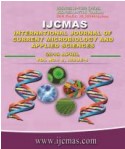


 National Academy of Agricultural Sciences (NAAS)
National Academy of Agricultural Sciences (NAAS)

|
PRINT ISSN : 2319-7692
Online ISSN : 2319-7706 Issues : 12 per year Publisher : Excellent Publishers Email : editorijcmas@gmail.com / submit@ijcmas.com Editor-in-chief: Dr.M.Prakash Index Copernicus ICV 2018: 95.39 NAAS RATING 2020: 5.38 |
Abiotic stresses such as drought, salinity, heat and cold, are greatly affecting the plant growth and agricultural productivity and causes more than 50% of worldwide yield loss of major crops every year. It is a major global problem that limits crop productivity. Yield potential of modern cultivars is limiting by stress factors. These stresses are increasing because of the declining availability of good quality water, land degradation and pollution. In the plant, stress results in nutritional imbalances causing a reduction in water uptake and an increase in toxicity, decreasing the product. In many parts of the world salinity and drought are the major abiotic stresses that limit and pose a threat to agricultural production. These stresses are interconnected as osmotic stress, resulting in the disruption of ion distribution and homeostasis in the cell. In India, abiotic stresses are the primary cause of crop failures. Hence, it is necessary for the adoption of the stress response mechanism in field crops.
 |
 |
 |
 |
 |